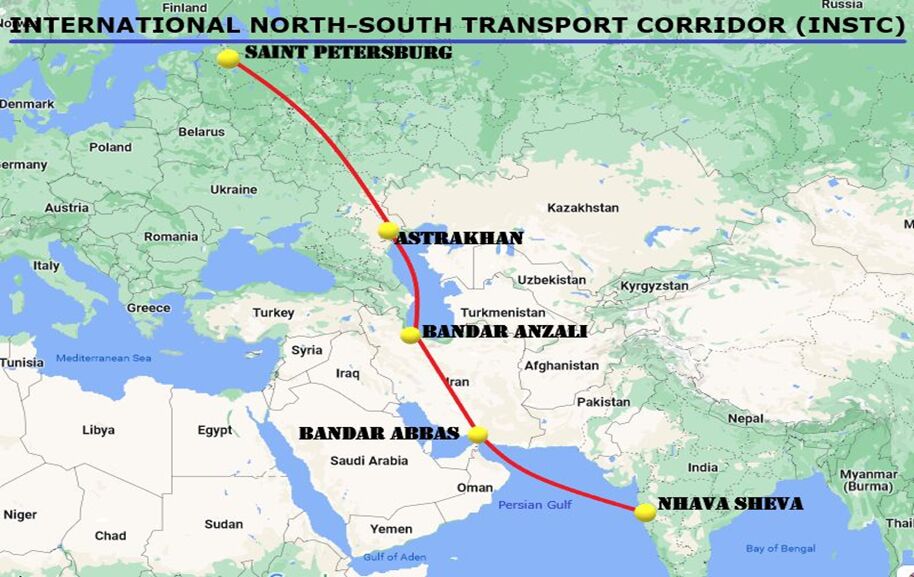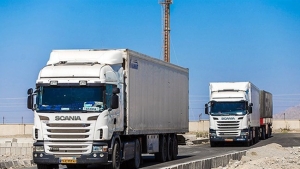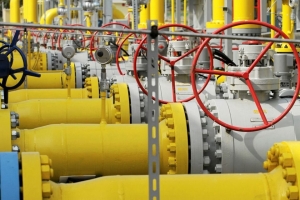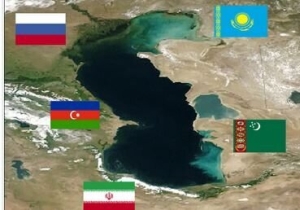ecocci
Iran, Pakistan discuss expansion of barter trade
In a meeting between a visiting Iranian private sector delegation to Pakistan and Pakistani central bank officials on Wednesday, the two sides reviewed the implementation of a barter trade mechanism between the two countries.
They also had discussions on resolving differences between Tehran and Islamabad on ways to implement barter trade.
Iran and Pakistan are seeking a barter trade mechanism in a bid to tackle the banking problems on the way of trade between the two neighboring countries.
Zahedan Chamber of Commerce is pursuing the case on behalf of Iran while Quetta Chamber of Commerce and Industry is also representing Pakistan in negotiations about barter trade with Iran.
President of Iran Chamber of Commerce, Industries, Mines, and Agriculture (ICCIMA) Gholam Hossein Shafei, who is heading the Iranian delegation to Pakistan, said that relations between the two countries are exemplary.
He said that despite these close relations, the volume of trade between Iran and Pakistan is “limited and not defendable”.
Barter trade can be a good way for increasing the level of Tehran-Islamabad trade at present, Shafei said, adding that a large number a commodities are in both countries that can be bartered.
The Iran Chamber of Commerce president also stressed the need for an easy passage of the Iranian transit trucks into the Pakistani border as well as accelerating the execution of a free trade agreement between the two countries.
He also said that Iran and Pakistan can use national currencies in bilateral trade to give a boost to exchanges.
Iran, Pakistan private sectors sign three cooperation documents
Chamber of Commerce of Iran and Pakistan have signed three different cooperation documents including among others on forming a joint trade council and resolution of trade disputes.
It comes as a private sector delegation from Iran is on a visit to Pakistan during which the Iranian businesspersons will visit the Pakistani cities of Karachi and Lahore.
The documents were signed by President of Iran Chamber of Commerce, Industries, Mines and Agriculture (ICCIMA) Gholam Hossein Shafei who heads the Iranian delegation to Pakistan and President of the Federation of Pakistan Chambers of Commerce and Industries (FPCCI) Irfan Iqbal Sheikh.
The two sides agreed to establish a joint trade council between the two countries and to devise a mechanism for the resolution of trade disputes.
The agreed upon joint trade council is expected to work alongside Iran-Pakistan Joint Chamber of Commerce to help promote economic relations between the two neighboring countries.
Speaking during an earlier meeting with his Pakistani counterpart, the Iran Chamber of Commerce president said that the two countries plan to increase bilateral trade to $5 billion.
Forming a joint trade council will also be an exceptional opportunity, he said, calling on all those involved in Trade between Iran and Pakistan to become a member of this council.
Iran private sector eyes increased transit cooperation with Pakistan
Iranian private sector is seeking to further facilitate transit cooperation with neighboring Pakistan.
Behnam Faramarzian, the director of international transportation and TIR carnet department of Iran Chamber of Commerce, Industries, Mines and Agriculture (ICCIMA), on Sunday underlined the need for border activities with Pakistan, and the urgency for customs services to be provided 24/7 to help further activate border terminals between the two countries.
Faramarzian’s comments comes on the eve of a visit to Pakistan by an Iranian private sector delegation which is due to be headed by ICCIMA President Gholam Hossein Shafei.
Exploring ways to promote transit cooperation will be one of the main agendas of the visit to Pakistan by the Iranian delegation.
Faramarzian, who will be one of the members of the Iranian delegation to Pakistan, said that during his stay in the country, he will pursue expansion of terminals on the joint border, designing a green customs corridor and easing visa issuance process for truck drivers commuting across the joint border.
He believed that resolving transit problems will leave a direct impact on the level of trade exchanges between Iran and Pakistan.
Faramarzian also said that holding talks with the Pakistani operator of Islamabad-Tehran-Istanbul (ITI) Corridor is another agenda of the visit to Pakistan by the Iranian delegation.
During their five-day stay in Pakistan, the Iranian delegation will visit the cities of Karachi and Lahore.
Apart from private sector activists, representatives from the Iranian government will also attend the delegation.
The delegation will be comprised of businesspersons active in different areas including, food and agriculture, oil and gas, electricity and water, petrochemicals, constructional and mining products, pharmaceutical equipment and cosmetics, knowledge-based technology and transportation.
Iran private sector eyes increased transit cooperation with Pakistan
Iranian private sector is seeking to further facilitate transit cooperation with neighboring Pakistan.
Behnam Faramarzian, the director of international transportation and TIR carnet department of Iran Chamber of Commerce, Industries, Mines and Agriculture (ICCIMA), on Sunday underlined the need for border activities with Pakistan, and the urgency for customs services to be provided 24/7 to help further activate border terminals between the two countries.
Faramarzian’s comments comes on the eve of a visit to Pakistan by an Iranian private sector delegation which is due to be headed by ICCIMA President Gholam Hossein Shafei.
Exploring ways to promote transit cooperation will be one of the main agendas of the visit to Pakistan by the Iranian delegation.
Faramarzian, who will be one of the members of the Iranian delegation to Pakistan, said that during his stay in the country, he will pursue expansion of terminals on the joint border, designing a green customs corridor and easing visa issuance process for truck drivers commuting across the joint border.
He believed that resolving transit problems will leave a direct impact on the level of trade exchanges between Iran and Pakistan.
Faramarzian also said that holding talks with the Pakistani operator of Islamabad-Tehran-Istanbul (ITI) Corridor is another agenda of the visit to Pakistan by the Iranian delegation.
During their five-day stay in Pakistan, the Iranian delegation will visit the cities of Karachi and Lahore.
Apart from private sector activists, representatives from the Iranian government will also attend the delegation.
The delegation will be comprised of businesspersons active in different areas including, food and agriculture, oil and gas, electricity and water, petrochemicals, constructional and mining products, pharmaceutical equipment and cosmetics, knowledge-based technology and transportation.
Tajikistan launches rail transit route through Iran Economy
TEHRAN - The first freight train of Tajikistan heading for Turkey began its journey through Uzbekistan, Turkmenistan and Iran, in a ceremony on Wednesday, Deputy Transport Minister Shahriyar Afandizadeh announced.
According to Afandizadeh, senior officials from the mentioned countries attended the inauguration ceremony held in Dushanbe, Mehr News Agency reported.
The ceremony was also attended by transport companies, businessmen, and transport officials.
Upon the invitation of the Minister of Transport of Tajikistan to attend the opening ceremony of the multimodal transport corridor along Tajikistan, Uzbekistan, Turkmenistan, Iran, and Turkey's territories, delegations from these countries visited Dushanbe on October 17.
The Iranian delegation also visited the city of Kulob, which is a free zone of Tajikistan and is supposed to be the center of trade, transit and industry of Tajikistan.
Tajikistan's logistics conference was simultaneously held with the participation of various countries.
On the sidelines of this conference, bilateral meetings were held between Iran, the Minister of Transport of Uzbekistan and the Minister of Transport of Tajikistan regarding the expansion of cooperation, especially in transit, Iran's deputy transport minister said.
Targeting 20 million tons of freight transit was one of the most important agendas of these meetings. It was decided to conclude a joint action plan and a new transit agreement with Uzbekistan so that bilateral cooperation can be operational both along the north-south corridor and in the east-west corridor.
Noteworthy, during the first ministerial summit on transit cooperation among regional countries on October 8-9 which was initiated for the first time by Iran, tripling the volume of transactions and 20 million tons of freight transit through Iran's territory were targeted.
Iran, Turkey discuss extension of gas export deal
During a visit to Turkey, Iranian Minister of Petroleum Javad Owji and senior Turkish economic and energy officials held negotiations on extension of a long-term agreement for pumping Iranian gas to Turkey.
The 25-year gas deal between Iran and Turkey will expire on 2026.
The two sides discussed whether to increase Iran’s gas exports to Turkey by inking a new deal or by extending the existing agreement.
It is said that both Iran and Turkey agree on the main principles for extending the deal.
During a visit to Tehran by Turkish President Recep Tayyip Erdogan, Iran and Turkey made the initial agreement to start negotiations on a new gas exports deal that will allow increased supply of natural gas from Iran to Turkey for a period of 25 years starting in 2026.
Tehran, Astana agree to resume oil swap
TEHRAN – Iran and Kazakhstan have reached an agreement to resume oil swap between the two countries, the portal of Iran Chamber of Commerce, Industries, Mines and Agriculture (ICCIMA) reported.
The decision was made during the visit of President Ebrahim Raisi to Astana for attending the 6th summit of the Conference on Interaction and Confidence Building Measures in Asia (CICA).
Iran started swapping crude oil with Kazakhstan a decade ago, but the Iranian government halted the shipments, reportedly because the deal did not allow it to benefit proportionally from rising oil prices.
Iran, Russia, Azerbaijan agree on development of strategic corridor
Representatives of Iran, Russia and Azerbaijan have reached an agreement on the development of the western branch of the International North-South Transit Corridor (INSTC).
The agreement was signed during a ministerial meeting of Iran and five Central Asian countries + Russia and Azerbaijan (known as 6+2) in Tehran.
Iran, Russia and Azerbaijan agreed on completion of Rasht-Astara railway as a final step to finalizing INSTC transit project.
The eight participating countries also signed a statement on transit promotion in the end of the two-day event.
Iran began the construction project of the Rasht-Astara railway in northern country early in August.
Speaking to reporters, Astara Governor Enayat Rezaeipour said that some 10,000 billion rials is estimated to be needed for the completion of the project.
He also said that the project is predicted to be complete within a 36-month time span.

The map shows International North-South Transit Corridor (INSTC).
During a meeting between Iranian Minister of Road and Urban Development Rostam Qasemi and his Russian counterpart Vitaly Savelyev in late April, the Russian minister had expressed hope that the Rasht-Astara rail project will be completed as part of the North-South Corridor through mutual cooperation of Iran and Russia.
Savelyev said that once the rail road projects, the Rasht-Astara in particular, are completed, North Europe will be linked to India which will have many benefits for the countries on the way, including Iran and Russia.
The eastern section of the International North-South Transit Corridor (INSTC) was officially launched in July as the first rail transit cargo from Russia to India arrived in Iran through Sarakhs border crossing.
Iran resumes gas exports to Turkey
TEHRAN – Head of the National Iranian Gas Company (NIGC) Dispatching Department Mohammadreza Jolaei said Iran has resumed gas exports to neighboring Turkey following the resolving of some technical issues in the export pipelines.
According to the official, Iran's gas exports to Turkey had been halted for eight days since Monday, October 2 to carry out periodical repairs by both countries in accordance with a previous agreement, Shana reported.
Gas flow resumed on Monday, October 10 at 10:10 AM Tehran Local Time, after the completion of the repairs, the official said.
Iran is Turkey's second-biggest supplier of natural gas after Russia. Tehran sells about 10 billion cubic meters a year of gas under a 25-year supply deal to Turkey which it uses for electricity generation.
The gas exports are carried out via a 2,577 km (1,601 miles) pipeline running from Tabriz to Ankara.
After the re-imposition of U.S. sanctions in November 2018, Turkish President Recep Tayyip Erdogan made it clear that his country would continue to buy natural gas from the Islamic Republic.
Natural gas exports from Iran to Turkey had also come to a halt on March 31, 2020, after an explosion and fire at a pipeline on the Turkish side of the border; the reasons for the blast were not officially announced.
Iran resumed gas exports to Turkey after a three-month hiatus.
Earlier this year, Erdogan announced Turkey’s plans for purchasing more oil and gas from Iran amid greater energy needs and developing ties between the two countries.
Making the remarks in an interview with the state-owned broadcaster, TRT Haber, in late July, Erdogan said: "Turkey will increase its purchases of oil and natural gas from Iran", noting that the trade volume between Ankara and Tehran could reach $30 billion.
Erdogan's announcement came a week after his meeting with his Iranian and Russian counterparts, Ebrahim Raisi and Vladimir Putin, in Tehran, in which Turkey and Iran signed eight memorandums of understanding (MOUs) and agreements in various fields including trade and investment.
Erdogan reiterated the need for the development of ties at a joint conference with Raisi in Tehran last week, following the signing of the mentioned agreements.
Iran can become a safe energy transfer corridor: expert
A senior expert in energy economics says: “In the absence of investment and access to the necessary technologies to realize production from Iran's share of reserves in the Caspian Sea, the most important step is to enter the oil and gas swap sector and convert the opportunity in the territorial geography of the country to leap towards becoming a safe energy transfer corridor.”
In an exclusive interview with Shana, Fereydoun Barkeshli stated that Iran's energy policies have been focused on the southern part of the country during the past decades, and after the development of the South Pars gas field, this policy has been strengthened.
He pointed out that after the collapse of the Soviet Union and the formation of newly independent republics and the entry of international oil and gas companies, the Caspian Sea was considered a source of energy for the world and neighboring countries, and stated: “During the two decades after the collapse of the former Soviet Union, the Islamic Republic of Iran was mainly focused on the legal aspects and the way of division. However, the other neighbors, independent of the legal status of the sea, engaged in drilling and exploitation with the cooperation of international companies.”
The collapse of the Soviet Union on December 8, 1991, was one of the most important geopolitical events of the century in which two world wars took place. The leaders of the socialist republics of Russia, Belarus, and Ukraine signed an agreement in Belarus on this day, according to which the dissolution of the Soviet Union was announced and ended the work of the Soviet Union from that moment. The document also announced the creation of the Commonwealth of the Independent States, which included most of the former Soviet republics. Kazakhstan was the last member republic of the former Soviet Union to declare independence.
Necessity of using technology and financial resources in the Caspian Sea
The senior expert in energy economics stated that in the years after the establishment of the so-called newly independent republic, there were no sanctions against Iran except the one imposed by the United States (1981) by other countries, and clarified: “In any case, the Iranian part of the Caspian Sea is deep and has more rich gas resources, so the need to access technology and international financial resources is almost inevitable.”
Barkeshli continued: “The countries along the Caspian Sea mostly started exploitation by signing attractive contracts with companies that own technology and capital, although the US and Europe seriously entered the scene of the Caspian Sea energy equations with geostrategic motives.”
Strong consultation, diplomacy with main players
He pointed out that the slowness and lack of national determination and planning held Iran back to some extent compared to other countries in the region, adding: “Of course, the greatness of South Pars also aggravated Iran's neglect of the Caspian resources.”
The senior expert in energy economics added: “In the absence of investment and access to the necessary technologies in producing from the reserves of Iran's share, the most important thing that can be done is the widespread entry into oil and gas swap plans and the conversion of opportunities in the country's territorial geography to jump towards becoming to a safe energy transfer corridor.”
By stating that Iran's oil and gas sector is widely scattered and versatile, Barkeshli said: “Several thousand kilometers of oil and gas transmission lines across the country can be connected to entry points and transmission to other neighboring countries with limited investment.”
He said: "Right now, the battle of corridors or energy corridor strategy is one of the most important geostrategic issues in the world. How to optimize this situation and get the maximum short-term and long-term benefits requires consultation and strong diplomacy with the main players."










